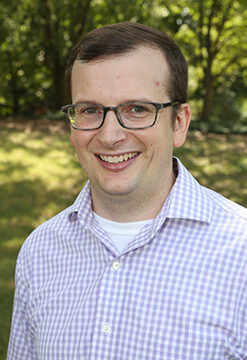
After receiving his bachelor’s in mechanical engineering from North Carolina State in 2005, Anderson went to work as a product development engineer for Caterpillar, the world’s largest construction equipment manufacturer. In 2010, the pursuit of a doctoral degree caught his interest and he found himself at Georgia Tech’s Woodruff School of Mechanical Engineering working with Dr. Andrei Fedorov for the duration of his master’s and PhD.
Anderson completed his thesis-based masters degree on an Air Force Research Lab project studying condensation on nanostructures with amphiphilic surfaces (i.e. surfaces that have a combination of hydrophilic and hydrophobic patterns). He then turned his sights to the problem of fuel cell vehicles and the prohibitive cost of developing a hydrogen delivery infrastructure. He wanted to find a way to produce hydrogen from natural gas using a catalytic reaction at a significantly lower temperature than commonly happens in the chemical industry right now. “What I was trying to do is say, hey, we have this natural gas distribution pipeline which makes it easier to transport natural gas than hydrogen,” he explained. “Could we essentially pipe the gas to the point of use, for example, the equivalent of a gas station for a fuel cell, and make the hydrogen fuel right there?”
A National Defense Science and Engineering Graduate Fellowship, awarded during his third year, resulted in funding for the project and enabled Anderson to pursue his PhD. Employing uniquely combined reaction and separation approaches in hopes of circumventing some of the thermo dynamic limits typically required to facilitate a reaction at high temperatures, he found a way to significantly reduce the reaction temperature to a point that would make his vision feasible.
Today Anderson’s focus is far broader. As senior engineer at Exponent, a multi-disciplinary engineering and scientific consulting firm, his work covers a variety of industries from medical devices and consumer products to oil and gas and even textiles. Being aware of what’s going on in several different fields allows him to see connections and bring an outside and unique perspective to diverse industry challenges, which can give rise to interesting solutions. “That's the nice thing about consulting at Exponent as compared to the big management consulting firms. I really am using fundamental science to solve unique technical problems, and getting to branch out into industries that I never thought I'd work in.”
He likes to describe Exponent as a kind of “rent-a-PhD” operation. Companies face numerous technical challenges that can arise at any time in any number of areas and it can be cost prohibitive to have someone on staff, full-time, with the level of capability and knowledge of a PhD. With a staff of over 700 consultants, more than half of which have PhDs in their fields, Exponent provides collaboration and expertise to solve challenging problems for short-term engagements.
Anderson was introduced to Exponent at a career fair on campus and found that the company was a natural fit for what he was looking for – that perfect blend of industry and academia. “I’m a very applied person, and I like solving urgent, immediate problems. I realized that at least in this stage of my life, the pure form of discovery in academia wasn’t what I wanted – but I also left industry because it was too routine and there wasn’t enough room for creativity. I like to refer to Exponent in terms of the children’s story Goldilocks – not too hot and not too cold. It’s right in the middle.”
Anderson credits the Woodruff School’s approach to curriculum, allowing students to pick their own academic paths, as the foundation for his ability to comfortably branch out into, and be open to, a variety of industries. “The nice thing about mechanical engineering is that it is so broad. I think as a mechanical engineer you are trained to be more of a generalist but then you can do deep dives into specific topics, and you have the capacity to become an expert. But you don't focus in on one solo path - everything stays out there for you. I definitely use the fundamental first principles and deep technical knowledge I learned at Tech, but beyond that I learned how to approach hard problems, think critically, and ask the right questions to generate insight and deal with uncertainty.”
Reflecting on his career thus far, Anderson acknowledges that he has become more adaptive and open to whatever path presents itself. Making a difference and an actual impact on people and the world in a general sense holds a great value. And for undergraduate and graduate students, he has some advice to impart. “If I could convey one concept to any student at Tech, this is it: You’re always a constantly evolving and developing person, so don’t underestimate your capacity to change and grow and develop. Do something you never thought you could see yourself doing. Whatever it is - maybe you think you're really at risk at first but under the right conditions you could develop into someone who could have a great idea and start a company. Just because you don't see that path right now doesn't mean that it's not there and that you aren't going to be able to find it eventually.”
At the end of the day, Anderson views mechanical engineering as a framework and a toolkit for solving the really interesting, pressing problems in the world. “It’s a way of looking at things and a way of approaching things to try to make them better – and it’s exciting! Ultimately, it’s a mindset of constant improvement.”
